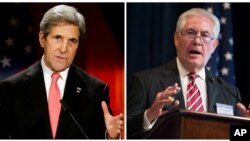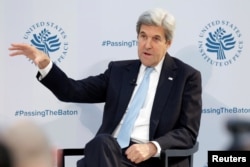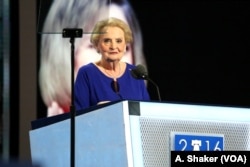U.S. Secretary of State John Kerry has yet to meet his presumptive successor, little more than a week before the inauguration, and senior American diplomats in Washington have had few encounters with members of President-elect Donald Trump's transition team.
"There are some people [from the transition team] who have been in the building for a period of time, but quite candidly, I think there has not been a lot of high-level exchange at this point in time," Kerry said Tuesday at the U.S. Institute of Peace. "I'm still expecting to meet with my successor at some point in the near term."
Kerry and Rex Tillerson, Trump's choice to head the State Department, have spoken by telephone once since the president-elect nominated the ExxonMobil chief executive, according to State Department officials.
"The secretary, certainly, would value the opportunity to sit down one on one with Mr. Tillerson to really talk about some of the challenges he sees going forward," State Department deputy spokesman Mark Toner told reporters Tuesday afternoon.
Toner said there is no reason the two have not met apart from scheduling issues.
Tillerson's hearing Wednesday
The confirmation hearing in the Senate for Tillerson, who has stepped down from his posts at ExxonMobil, begins Wednesday morning.
Kerry, in some of his most blunt criticism yet of the president-elect, blasted his controversial diplomacy via Twitter.
"If policy is going to be made in 140 characters on Twitter and every reasonable measurement of accountability is being bypassed and people don't care about it, we have a problem," Kerry said at a "Passing the Baton" event at the U.S. Institute of Peace.
That sentiment was echoed at the same event by former Secretary of State Madeleine Albright.
"I'm very concerned about the tweets" by Trump, Albright said, adding that reducing nuanced foreign policy to impulsive tweets "doesn't do it for me."
'Give Trump appointees space'
Sitting alongside Albright, former NATO commander James Stavridis, a retired U.S. Navy admiral, said it is premature to judge the next administration's policy stances based on Trump's tweets and other comments he and his team have made.
"We've got to give them some space to shape the view" of their policies, said Stavridis, who is dean of the Fletcher School at Tufts University.
A point of agreement among those at Tuesday's USIP event is that North Korea should be a primary concern at the White House, Pentagon and State Department when the Trump administration comes to power.
During the eight years of Obama's presidency, the tightening of international sanctions and diplomatic pressure failed to deter Pyongyang's pursuit of nuclear weapons and ballistic missiles.
North Korea a major threat
The threat posed by North Korea "is one of the most serious, if not the most serious" issue that faces the incoming administration, Kerry said hours later in remarks at the U.S. Naval Academy in Annapolis, Maryland.
Back at the U.S. Institute of Peace, former secretary Albright characterized Kim Jong Un as "a nut case."
Asked by VOA whether the current State Department shares that assessment of the North Korean leader, spokesman Toner said he would "refrain from that kind of colorful assessment," but he noted that American diplomats are "very concerned" about Kim's behavior and his regime's pursuit of weapons that would create instability in the region.







